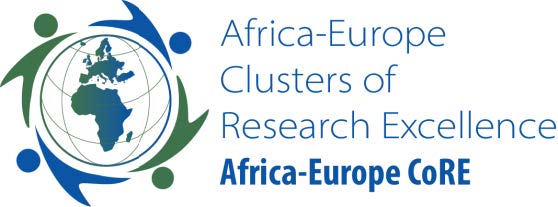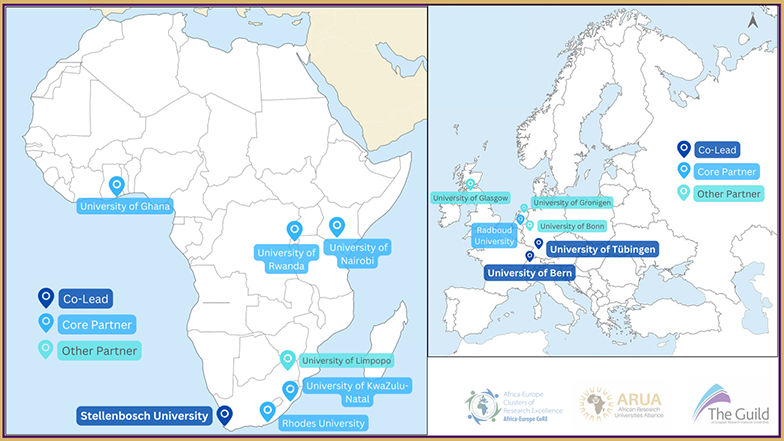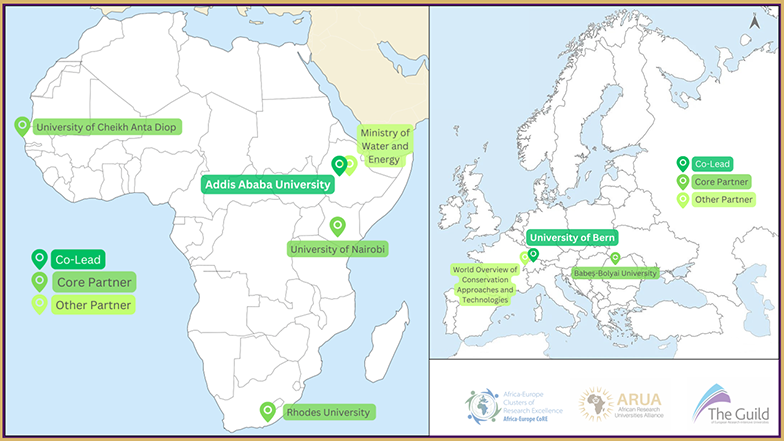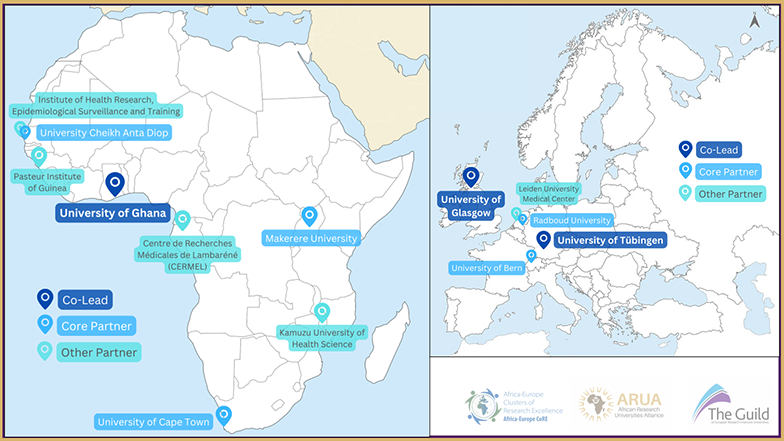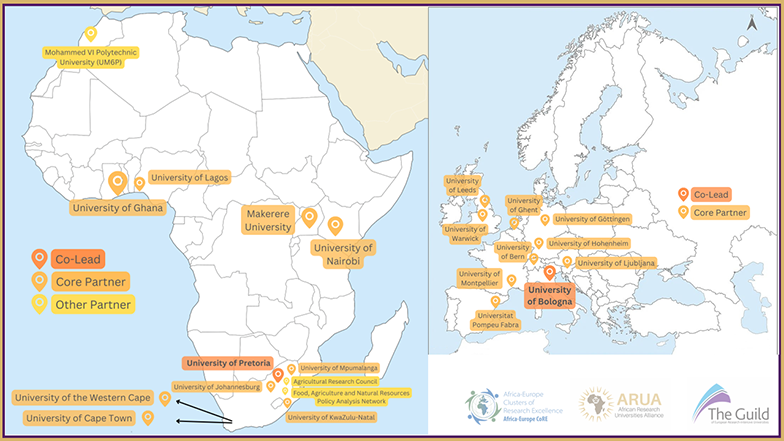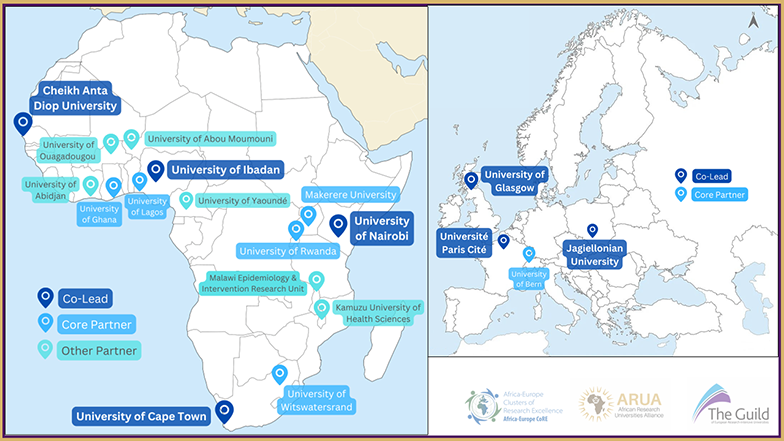Africa-Europe Clusters of Research Excellence (CoRE)
The African Union (AU) and the European Union (EU) adopted in July 2023 the joint AU-EU Innovation Agenda to enhance cooperation in science, technology and innovation. At the same time, universities have been engaged and contributing to the priority areas of the AU-EU Innovation Agenda. Research, innovation, education and universities as networked actors can be a key part of a competitive, 360-degree approach for Europe’s international partnerships with colleagues in Africa and across the wider global stage. One of them is the Africa-Europe Clusters of Research Excellence (CoRE) launched by the African Research Universities Alliance (ARUA) and The Guild of European Research-Intensive Universities. Twenty-one CoREs have been established, demonstrating a new form of widespread collaboration with the best researchers from both continents. This collaboration is enabled by resources committed by universities, the private sector and civil society. They have ambitious long-term plans at the cutting edge of excellent science and socio-economic challenges to produce outcomes of mutual, strategic benefit for Africa and Europe. CoREs offer an opportunity for sound investment to enhance cooperation between the continents by scaling up, consolidating existing efforts and building an ecosystem between different actors on both continents.
Genomics for Health in Africa
The CoRE "Genomics for Health in Africa" aims to leverage the potential of genomics to revolutionise healthcare in Africa. Genomics can provide a better understanding of rare diseases, cancers, and infections, which can lead to more effective treatments.
Combined with biochemical, biophysical, and structural analyses, genomics serves as a powerful tool for precision medicine and personalised treatment approaches. However, despite its enormous value, genomics is underutilised in Africa due to insufficient infrastructure, resources, and scientific capacity.
This CoRE will build capacity for genomics-based diagnostics of rare diseases, cancers, and infections, coupled with investigating protein structure-function relationships and supporting optimal drug treatment and vaccine development. It will provide a unique and open platform to the African research community to exploit the full potential of genomics coupled to protein structure function studies, as a fundamental tool to revolutionise public healthcare for both infectious and rare non-communicable diseases.
Co-Leads
ARUA
- Stellenbosch University, South Africa
- Prof. Dr. Shahida Moosa - Head of Medical Genetics, Tygerberg Hospital
- Prof. Dr. Tulio de Oliveira – Director, Centre for Epidemic Response and Innovation
The Guild
University of Bern, Switzerland
- Prof. Dr. Carmen Faso - Multidisciplinary Center for Infectious Diseases (MCID) Co-Chair and MCID Interfaculty Lecturer
- Prof. Dr. Volker Thiel - MCID Co-Chair and Professor for Virology
University of Tübingen, Germany
- Dr. Tobias Haack – Deputy-Director & Lead Physician, Institute of Medical Genetics and Applied Genomics; Center for Rare Diseases
- Prof. Dr. Olaf Riess – Director of the Institute of Medical Genetics and Applied Genomics; Center for Rare Diseases; Center for Personalized Medicine
Sustainable Water and Land Resource Management for Human Well-Being
Land degradation, associated conflicts, and climate change are global development challenges that particularly affect African countries. Progress in combating land degradation is lagging expectations and was further slowed by the Covid-19 pandemic. This calls for urgent responses and sustainable actions that go beyond business-as-usual practices.
The overarching goal of this CoRE is to link key research partners in sustainable water and land resource management with partners from policy and practice. Together, these teams would address land degradation to foster sustainable development, conflict resolution, and human well-being. Taking care of land, water –and, in particular, the long-term health of ecosystems and landscapes – is fundamental to ensuring food security, to building resilience to climate change and pandemics, and to supporting sustainable livelihoods. This CoRE contributes mainly to the “Green Transition” priority area, and partly to “Innovation and Technology” and “Capacities for Science”.
Co-Leads
- The Guild
- University of Bern, Switzerland. Prof. Dr. Thomas Breu - Director Centre for Development and Environment (CDE)
ARUA
Addis Ababa University, Ethiopia. Gete Zeleke - Director Water and Land Resource Centre (WLRC)
Advanced Infectious Diseases Research and Training
This CoRE will tackle the next frontiers in infectious disease (ID) research in an equitable partnership. Their overarching goal is to understand the fundamental biology of pathogens and of infections, and to inform drug and intervention discovery and development.
ID pathogens have divergent biology and complex interactions with their host and the environment. Meaningful progress towards disease control necessitates an integrated and multidimensional understanding that can only be achieved in a partnership of complementary and synergistic expertise that our Cluster embodies.
Further, the under-representation of researchers based in Africa in the field’s global leadership, and their limited access to cutting-edge technologies, form major barriers for significant leaps in progress as many IDs are endemic in Africa.
This CoRE will overturn this damaging inequality, through an equitable and open revolving door model for training in existing skills, and through simultaneously establishing novel technologies in partnership between ATG scientists.
Among other Core Partners
Carmen Faso, MCID Co-Chair and Interfaculty Lecturer; et al. University of Bern Multidisciplinary Center for Infectious Diseases (MCID), Switzerland
Sustainable Food Systems
As a truly global platform, the Africa-Europe Cluster of Research Excellence (CoRE) will address food systems challenges by (1) conducting collaborative research on food systems transformation, (2) assuring continuity through a 10-year collaboration, (3) pooling resources for scale and impact, and (4) significantly bolstering capacity in African institutions. Collaboration will span disciplines, geography, and sectors, enabling solutions that transcend unilateral approaches.
The 10-year Action Plan aligns with four pillars: Research, Education / Capacity Development, Societal Impact, and Networking. The plan draws on the broad fundraising and rich network capabilities inherent in the Cluster membership. Building on the sound foundation of already established partnerships and programmes, extensive collaborative research and capacity building are envisaged, with a particular focus on early career researchers embedded in joint projects. By ensuring that the next generation scientists operate within a global community that co-creates solutions with multi-sectoral stakeholders, the Cluster will make substantive contributions to addressing challenges in African and European food systems.
Prof. Zerihun Tadele, Group Leader: Institute of Plant Sciences – University of Bern, Switzerland is one of the CoRe Partners.
Non-Communicable Diseases and Multimorbidity
While Europe is in the post-epidemiological transition phase, with chronic diseases still the leading cause of death, but with slowly decreasing incidence and mortality rates, Africa is still in the epidemiological transition phase, with chronic diseases becoming the leading cause of death.
The CoRE in Non-Communicable Diseases and Multimorbidity aims to address the growing burden of non-communicable diseases (NCDs) and their co-morbidities in Africa. The Cluster's mission is to develop innovative and context-specific solutions for the study, prevention and management of NCDs and their co-morbidities in low- and middle-income countries. The Cluster will focus on building research capacity, conducting cutting-edge research, and promoting knowledge translation and dissemination, as well as mobility and exchanges. The Cluster's approach is multi-disciplinary, collaborative, and participatory, with a focus on equitable partnerships and community engagement. Further, Africa provides an opportunity for the global scientific community to understand the complex NCD mechanisms as well as to find solutions to the rising NCD problem in the region.
The Cluster's goal is to improve the health and well-being of populations in Africa by reducing the burden of NCDs and co-morbidities across the lifespan and to contribute to the attainment of the Sustainable Development Goals.
Among other Core Partners
Prof. Stephan Windecker, Dept. of Cardiology, Bern University Hospital - University of Bern, Switzerland

